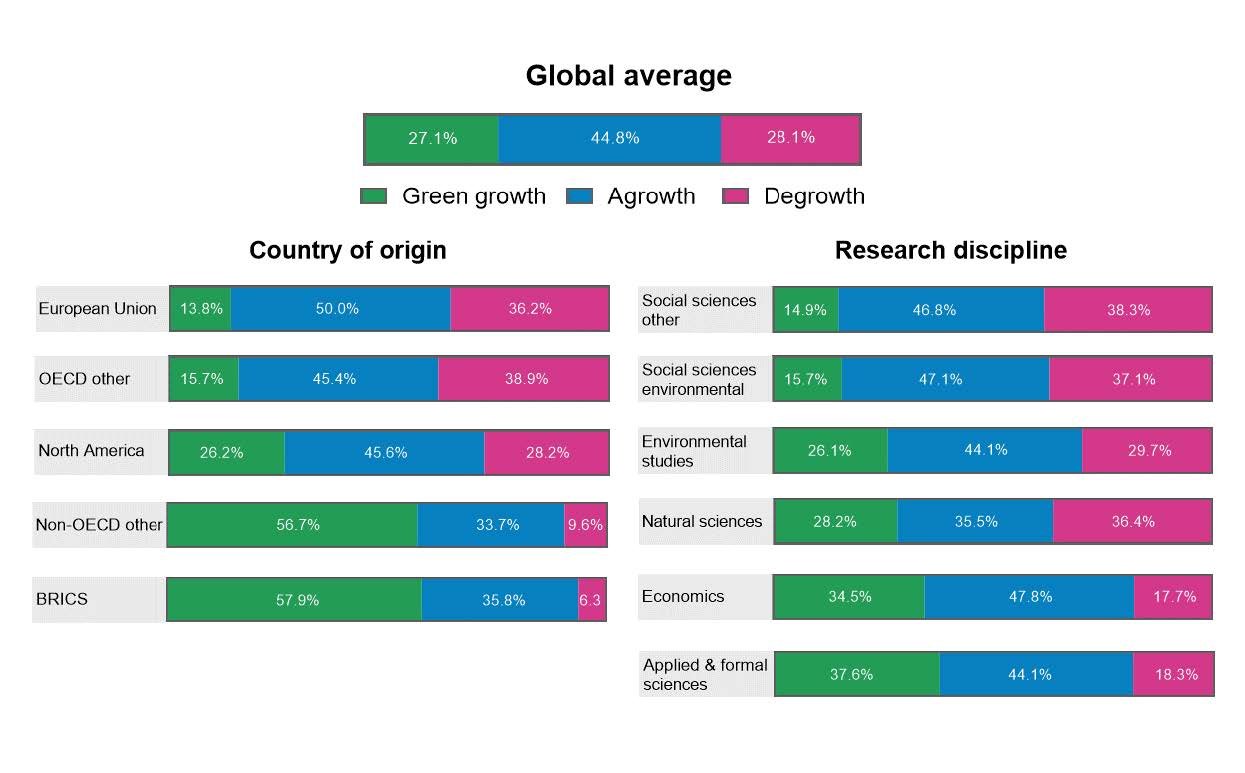
Despite strong promotion of green growth perspective by a variety of policymakers and international institutions, there is a widespread scepticism among climate policy researchers in high-income countries. This is what emerges from a new study published in Nature Sustainability in the context of the project “CAPABLE”, coordinated by CMCC.
The concept of green growth has become almost ubiquitous in recent years among policymakers and international institutions, including the World Bank, the European Union, and the OECD. Nonetheless, a growing body of research within the scientific community is challenging the idea that green growth is fundamentally possible or even desirable, while pointing to other alternatives.
The article “Shades of green growth scepticism among climate policy researchers”, published in Nature Sustainability – by a team of researchers from the Institute of Environmental Science and Technology at UAB, ESCP Business School, Graduate School of Economics and Management at UrFU and University of Malaga – shows that a growing body of researchers emphasise the need to prioritise sustainability, social justice, and human well-being, even if this means a reduction in material consumption and economic activity. The paper was realized in the context of the project “CAPABLE. ClimAte Policy AcceptaBiLity Economic framework”, coordinated by the CMCC Foundation and aimed to provide robust, resilient and actionable recommendations for the design of socially and economically acceptable climate policy measures for 2030 and beyond.
The new economic paradigm called post-growth argues that the pursuit of infinite economic growth is incompatible with planetary boundaries. In other words, alternative economic frameworks are needed to achieve long-term sustainability and well-being. Post-growth scholarship has evolved and diversified in a variety of perspectives that can fall into two main categories: degrowth and agrowth*. From the survey, we can see that:
- 73% of the 764 surveyed researchers indicated options – agrowth or degrowth – preferable to the green growth one, but there are notable differences in the degree of scepticism depending on the country and on the research discipline of the researchers surveyed.
- 86.1% of the researchers from the European Union for instance, expressed very high levels of scepticism about green growth, while North American researchers are less likely to hold degrowth positions compared to those from other OECD countries.
- In contrast, more than half of the researchers from non-OECD countries, most importantly BRICS, expressed views aligned with a green growth position.
- Social scientists, excluding economists, were the most sceptical of green growth, while on the other hand environmental and other economists expressed views aligned with green growth.

Respondents’ positions on the growth versus environment debate
As income and welfare indicators rise among the respondents, there is a growing belief in the post-growth notion. To simplify, these researchers argue that beyond a certain point, prioritising GDP is misguided as the social and environmental costs of pursuing further growth may exceed the benefits. “We also found that climate policy researchers with a degrowth position tend to support direct regulation (standards, quotas, bans) while green growth proponents support innovation subsidies. It is worth studying if countries have systemic differences in their policy implementation depending on their income level” adds one of the co-authors, Ivan Savin.
The paper shows that green growth scepticism is more prevalent among researchers in high-income countries than might be expected from its extensive institutional and political support.
Additional information
Sponsors
This work received support from the European Union’s Horizon Europe research and innovation programme under grant agreement number 101056891, ClimAte Policy AcceptaBiLity Economic (CAPABLE) framework, the ‘María de Maeztu’ Programme for Units of Excellence of the Spanish Ministry of Science and Innovation (CEX2019-000940-M) and the ERC Advanced Grant from the European Research Council (ERC) under the European Union’s Horizon 2020 Research and Innovation Programme (grant agreement number 741087).
Degrowth and Agrowth definition
* Within the broader post-growth framework, degrowth stands as a pronounced stance, critiquing capitalism and advocating for a deliberate and equitable reduction in material consumption and economic activity in high-income countries to achieve more sustainable and socially just societies. Agrowth instead represents the idea of growth agnosticism. The central point is that progress should not be judged solely through GDP due to its inadequacy in reflecting societal well-being. Instead, policymakers should be neutral about economic growth as it could yield both positive or negative outcomes for the environment or social goals. In this sense. Agrowth can be interpreted as a middle-ground position situated between the green growth and Degrowth paradigms. Both agrowth and degrowth can be considered as shades of green growth scepticism, falling within the overarching post-growth framework.
Scientific article
King, L.C., Savin, I. & Drews, S. Shades of green growth scepticism among climate policy researchers. Nat Sustain (2023). https://doi.org/10.1038/s41893-023-01198-2


